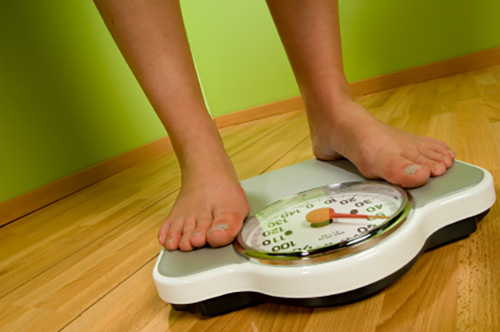Research shows that even small changes to the thyroid function can cause weight gain. In fact, many women who have been told their thyroid test results are “normal” may still have a reduced thyroid function (subclinical hypothyroidism) that’s enough to cause weight gain and other bothersome symptoms.
 In fact unexpected weight gain and difficulty losing weight may be the first noticeable signals that you’re struggling with hypothyroidism (a sluggish thyroid) or subclinical hypothyroidism. Many women are frustrated with gaining five pounds every year and not being able to figure out why!
In fact unexpected weight gain and difficulty losing weight may be the first noticeable signals that you’re struggling with hypothyroidism (a sluggish thyroid) or subclinical hypothyroidism. Many women are frustrated with gaining five pounds every year and not being able to figure out why!
Reduced thyroid function may be the result of the thyroid’s impaired ability to produce hormones, or the body may have difficulty using the thyroid hormones. Either way, problems with your thyroid hormones may cause the rate at which you use nutrients (your metabolic rate) to slow down.
We are especially prone to thyroid issues and weight gain as women because the thyroid is linked to other systems that affect weight — including the proper functioning of our neurotransmitters, reproductive hormones, and adrenal glands.
Thyroid issues affect women of all ages
While women of all ages suffer from thyroid issues, there are times in your life when your hormones fluctuate more and when the development of thyroid issues may be even more likely:
What can you do about thyroid issues and weight gain?
Making good nutrition and supplementation a consistent part of your life is the most effective way to support your thyroid. Consistency is so important! As women, many of us spend much of our lives dieting — sometimes in a yo-yo cycle of feasting or fasting. This is one example of how we may decrease our metabolic rate and put stress on other hormone systems — which leads to weight gain.
Here are our top tips for eating to support your thyroid:
T-Balance Plus

Do you want to:
Need to know more before you order?
- Choose whole foods for optimal nutrition. Iodine and selenium are the most important thyroid supporters, but you also need zinc, iron, and copper.
- Eat your meals and snacks at regular times, and be sure to eat breakfast within an hour of waking. Missing meals or snacks can stress your thyroid.
- Include protein at every meal, as well as fiber for breakfast and lunch. Remember that good sources of fiber include fruits and vegetables, not just grains.
- Completely eliminate gluten, sugar/sweeteners, alcohol, and junk food. These ingredients can interfere with healthy thyroid function.
- Learn which foods contain thyroid-suppressing compounds known as goitrogens — including cruciferous vegetables such as cabbage, broccoli, and cauliflower. Always steam or cook these vegetables to reduce or eliminate the goitrogens.
- Support your thyroid with a phytotherapeutic product, such as our T-Balance formula. Using leading research on trace minerals and phytotherapy for thyroid support, T-Balance is formulated to boost energy and support healthy cell metabolism not only in the thyroid gland but throughout the body. It includes bacopa, hops, sage, ashwagandha, and coleus forskohlii — as well as selenium and iodine.
Your opportunity to take action
At Women’s Health Network, we know that symptoms are your body’s way of signaling that it needs help. So if you start seeing unexpected weight gain and believe it may be related to your thyroid, this is a good time to listen to your body and take action based on how you feel, rather than a test result.
For many women, a balance of good nutrition, supplemental nutrients, and phytotherapy is the true support their thyroid needs to increase metabolic functioning and lose weight. An optimal diet is critical to prevent additional symptoms from progressing, as well as to promote overall thyroid — and body — health.
Fox, C., et al. 2008. Relations of thyroid function to body weight: Cross-sectional and longitudinal observations in a community-based sample. Arch Intern Med., 168 (6), 587-592. URL: https://archinte.ama-assn.org/cgi/ijlink?linkType=ABST&journalCode=archinte&resid=168/6/58 (accessed 10.17.2011).










